

A heart transplant is a surgery carried out to replace a failing, damaged and dysfunctional heart with a healthier donor heart. This transplant is a medical treatment option for people who are in the end stages of heart failure. And for people who have tried several medications, lifestyle changes, and less invasive procedures which haven’t succeeded.
A lot of Africans travel each year to India to get quality heart transplant surgery. Cardiac procedures, especially a heart transplant in India are not only affordable but also very high quality with high success rates, performed by leading experts. This page will be a patient's guide to getting heart transplant surgery in India.
Heart Transplant is performed on a patient when the treatments for other serious heart ailments haven't succeeded. This may lead to a dysfunctional heart ultimately leading to heart failure. Here are the following conditions that can lead to heart failure:
In cases of advanced heart failure, heart transplantation is considered a lifesaving measure, that's because your heart has sustained a long-term injury or is weakening, rendering it unable to pump enough blood to the rest of your body. There is a vast range of possible causes for this form of heart failure. The majority of patients requiring a heart transplant suffer from one of the following:
■ Cardiomyopathy:
Diseases that affect the heart muscle are often referred to as cardiomyopathies. Infections and inherited disorders are two potential reasons. Even after a battery of tests, sometimes the root reason remains unknown (idiopathic).
■ Congenital disability affecting the heart:
Having congenital heart disease means you were born with a structural problem in your heart. As a last resort, a heart transplant may be necessary for patients with certain types of congenital heart disease who have developed advanced heart failure.
■ The disease of the coronary arteries:
Damage to the heart muscle is permanent if a heart attack occurs due to clogged arteries.
■ Inflammation of the heart's valves:
In both cases, the heart valves are damaged.
Transplanting a new heart into a kid or adult is conceivable up to age 70, in exceptional cases, up to age 75.
For a heart transplant, eligibility of both the patient and donor is highly investigated. Both should meet certain criteria set up by the medical professionals, failing which you can be held ineligible for the heart transplant.
As a patient, you can be denied eligibility for a heart transplant if you:
Heart transplant surgery lasts for several hours. If you've had previous heart surgeries, the surgery is more complicated and will take longer. You'll be put to sleep after being injected general anaesthesia before the procedure. Your surgeons will connect you to a heart-lung bypass machine to keep oxygen-rich blood flowing throughout your body.
Your surgeon will make an incision in your chest to separate your chest bone and open your rib cage. After the incision the surgeon would remove your diseased heart, leaving the pulmonary vein openings and the back wall of the left atrium intact.
After this, the surgeon stitches the donor heart with the major blood vessels to maintain the blood flow so that donor's heart starts beating normally. Post this transplant the heart-lung machine would be removed. Sometimes an electric shock is needed to make the donor's heart beat properly.
After a heart transplant surgery,
Since the heart transplant surgery is very delicate, as a patient you would be required to spend the initial few days post your heart transplant surgery in the Intensive Care Unit (ICU) after which you may be moved to a regular ward.
At the ICU, you'll be closely monitored at your outpatient transplant centre by your transplant team. You'll need to make long-term changes to your lifestyle your heart transplant surgery. These include:
■ Taking immunosuppressants
To suppress your immune system from attacking the donated heart.
■ Medications & check-ups
After your heart transplant surgery, you would be prescribed a lifelong plan of medications, lifestyle and certain do's and donts. You will be also required to make frequent visits to your doctor to keep a check on your health progress post the surgery.
■ Cardiac rehabilitation
These programs collaborate exercise with education to help you improve your health and recover after a heart transplant.
After receiving a new heart, most patients can live fulfilling lives. You'll be able to go back to work, your favorite pastimes, and even the gym, depending on how seriously ill you are. Talk to your medical professional about what physical activity you may safely engage in.
Pregnancy is possible for some women after heart transplantation. If you want to start a family following a transplant, you should discuss this with your physician.
Some drugs might create issues during pregnancy, so you should talk to your doctor about possible modifications to your regimen before trying to conceive. The success of a heart transplantation may affect a patient's chance of survival. Although there has been an increase in the number of older and higher-risk patients with heart transplants, survival rates have continued to rise. Survival rates for people worldwide are around 80% after five years and 90% after one year.
Finding the right cardiac specialist is an important step towards a successful heart transplant. India is one of the leading countries for availing advanced cardiac care, offering world-class medical expertise, state-of-the-art hospital facilities, and good results. The country is home to some of the most experienced heart transplant surgeons. Let's hear from some of our best heart transplant specialists in India:
Dr. Naresh Trehan is a top cardiovascular and cardiothoracic surgeon for heart transplants in India with over 50 years of experience. As Chairman and Managing Director of Medanta- The Medicity, he has led one of India’s premier cardiac-care hospitals. He has performed, to date, more than 48,000 cardiac surgeries, including heart transplants, bypass surgeries, minimally invasive procedures, and more.
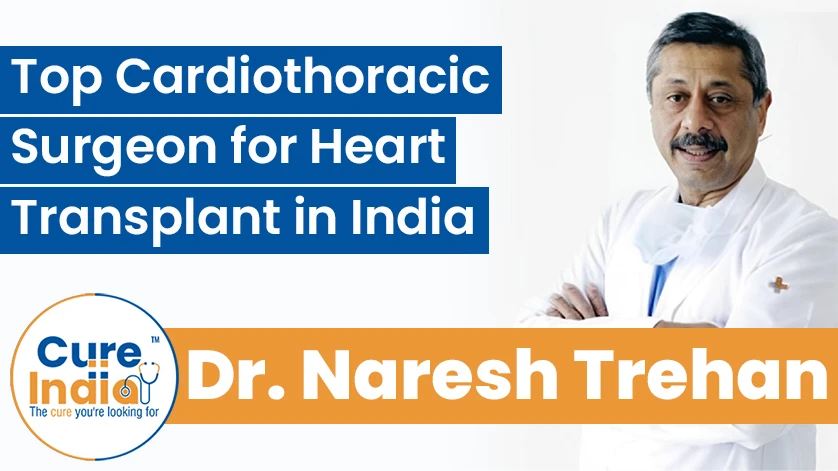
Dr. K.S. Iyer is an experienced heart transplant surgeon in India who is experienced in treating congenital heart defects and neonatal and infant cardiac problems. With more than 40 years of experience in pediatric and congenital heart surgery, heart transplants, TAVC repair, and more.
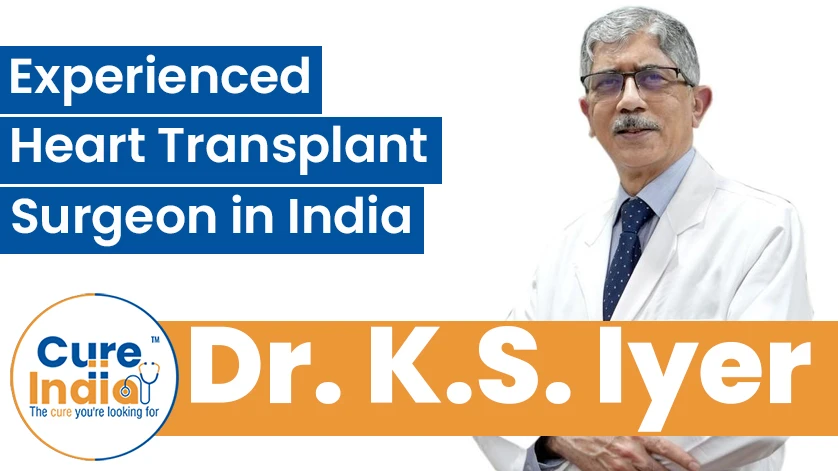
Dr. Z S Meharwal is a heart transplant specialist in India with more than 30 years of experience in adult cardiac surgery, transplant programmes and advanced cardiac interventions. His expertise includes heart transplantation, vascular surgery, valve repair, and management of heart-failure cases that require advanced support.
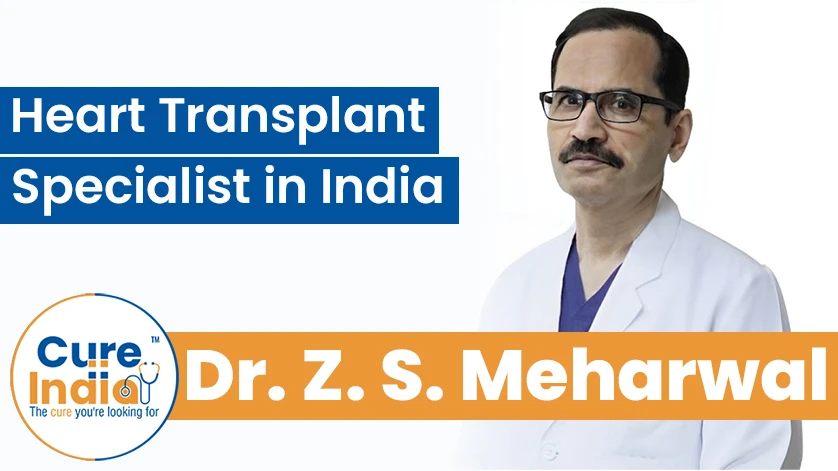
Dr. K R Balakrishnan is a leading doctor for heart transplants in India, with experience of over 40 years and international training in heart failure management, transplants, and mechanical circulatory support. Over his career, he has overseen more than 18,000 cardiac surgeries and advanced therapies for end-stage heart diseases.
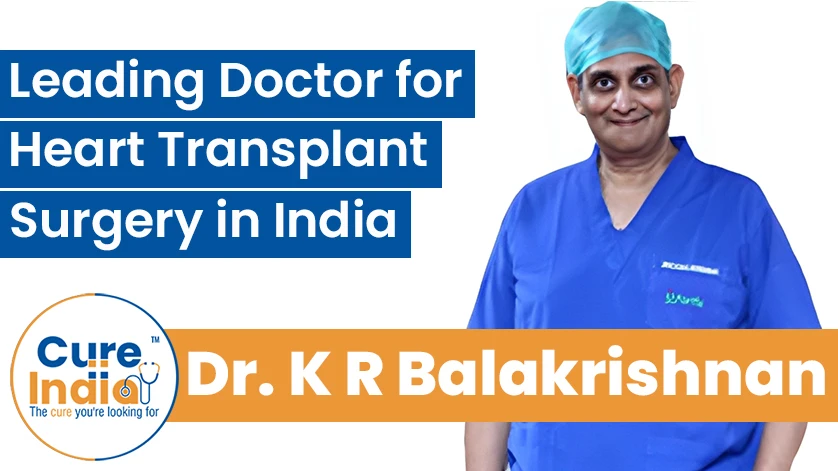
Many people from African nations like Kenya, Ethiopia, Tanzania travel to India seeking the best treatment at minimum cost. Indian heart transplant hospitals have world-class facilities and the surgeons in India are globally trained. The Government of India is providing different packages for international tourists who are specially visiting the country for medical care. The total cost of Heart Transplant in India is very low because of increased patients and low medical costs. In India, you can receive orthotopic and heterotopic heart transplant as well as bloodless heart transplant. Listed below is the cost of heart transplant in India:
| Treatment Name | Cost in India | Stay in India |
|---|---|---|
| Heart Transplant in India | $65,000 - $115,000 | 2 Months |
It is estimated that the total mortality associated with heart transplant procedure in India is only about 10 per cent, which is the lowest in the world. As a matter of fact, in some of the best hospitals for a heart transplant in India, the success rate of patients is as high as 90 to 95 per cent.
A heart transplant is performed when the patient is asleep and under general anaesthesia. The procedure itself typically lasts between four and six hours. When the transplant is performed, you will have a heart-lung bypass machine linked to your body. This equipment will perform the functions of the heart and lungs on its own. A thin and flexible tube catheter will also be implanted so that urine may be drained from your bladder both before and after the procedure.
Any person needing a heart transplant may find the expense a significant barrier to receiving one. Medication, consultation, and therapy for a terminal cardiac problem may be costly for the patient.
In most cases, doctors advise patients and their families to research insurance policies to see whether organ transplants are covered. This entails everything from diagnosis and preparation to transplant and subsequent rehabilitation. The factors that most affect the price are:
After a transplant, patients will need to take medicine for the rest of their lives. Transplant patients who do not reside in the area around the hospital or who have travelled from another city for the procedure should also consider the cost of living in the destination location. Most importantly, patients and their loved ones will look for a short-term rental home close to the medical centre. Over months, these expenditures may become significant.
After a heart transplant, you will need ongoing monitoring. There will be a slew of checks in the first several months to see whether the replacement heart is functioning correctly and to rule out any potential complications. To have a high standard of living following a heart transplant, your health must be maintained at all times. Visit your doctor often and be forthright about any concerns you may have.

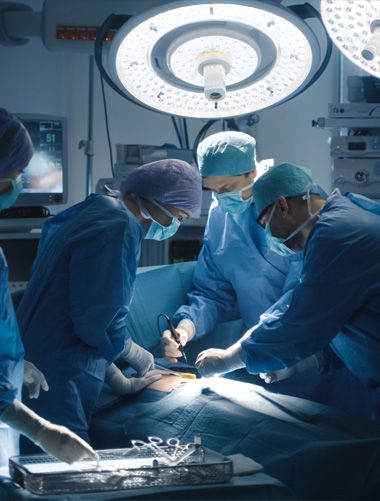
Successful Liver Transplant Surgery in India
Share Your Reports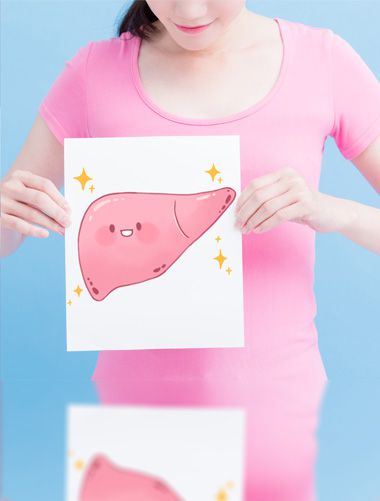
Minimally invasive Liver donor surgery
Book appointment